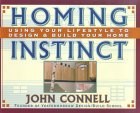
Green Home

| Scam Alert |
| About Tom Landis |
| The Owner Builder Coach |
|
|
|
RESOURCES |
|
FEATURE NEWS |
|
|
|
HOME BUILDING GUIDE |
| OWNER BUILDER COACH | SEMINARS | DOWN HOME RADIO | HOME BUILDING GUIDE |
|
|
DOWN HOME RADIO EXCLUSIVE
|
•Develop a budget for residential design services.
It's important to understand the cost range for stock drawings versus custom drawings. Ask an architect/designer for a copy of his/her ``standard conditions of their working agreement'' as well as a cost breakdown of what the design service may cost for the level of service provided. This is your opportunity to shop for the home designer best suited to your requirements.
Stock drawings may cost $400 to $1,200 for a set of eight blueline copies of a stock design. On a square footage basis, a residential designer may charge $0.40 to $1.25 per square foot of floor space to render a permit-ready design. A licensed and certified architect may charge 2% to 15% of gross hard costs of construction in order to provide a detailed set of construction documents plus full architectural services. Hourly fees vary widely.
Are there additional expenses you need to anticipate? Is a site survey required? Will the services of a structural or civil engineer be required? Does your site require a geotechnical analysis? Is there a presence of ecologically sensitive areas on your site which may require special consideration?
•Determine if the residential design firm specializes in a style.
It may be significant to attract a design professional who has created a home style which is similar to the style you're contemplating. This will largely depend on the complexity of the project or if it's a highly stylized design solution.
Architects are trained to ask questions and research factors required to design a project. Residential designers are similarly trained but are certified by a different accrediting agency. You may hire an architect or residential designer with equally good results. Or, if a stock drawing exists which is suited to your site criteria and your family's life style, this may also prove satisfactory.
Keep in mind that good design work is much more than rendering drawings. Design work is really about creative, critical thinking! But the heart of design work is one's ability to think through the entire design/build process understanding the interdependence of all factors, and how this interdependence affects decision making.
What style appeals to you? Victorian? Spanish? Colonial? Bauhaus? Usonian? Japanese? Pioneer? Are elements of universal design incorporated into the design solution?
•Discuss references for previous jobs similar to your project.
When considering references provided by a residential designer or architect, remember that only references which will provide a favorable response will be given. What you'll be seeking won't be the architect's or designer's favorable referrals as much as previous jobs similar to your project. Face it, no one's going to provide unfavorable referrals so judge whether the scope of work is similar to your project.
Another consideration: you may want to look for an architect/designer experienced in the local jurisdiction in which you intend to build. Some design firms are experts at designing homes within a specific locality with unique meteorological, biological, geological, or technical considerations. Without that specialized knowledge, a residential designer may struggle when s/he tries to create an original design or force a stock drawing into a situation in which there's incompatibility.
Where can you view samples of the designer's work similar to your project? Is the designer experienced in the local jurisdiction where your site's located?
•Define what will be accomplished and how you'll proceed.
It's necessary for the residential designer and owner to establish a relationship of trust. If the parties are not comfortable with each other, the design will suffer.
This goes for the relationship between the architect and contractor as well. Consider the selection of �The Owner Builder Coach� up front to help you in the selection of both the designer and builder. If you're choosing a stock design, ask your consultant to review the drawings prior to a purchase.
As in all businesses there are architects/designers who are the aggressive, get-it-done types; artists that abhor the trappings of the business aspect; and sensitive listeners who focus on the human gestalt. Besides being comfortable with the personality of the residential designer, ask for a collaborative decision-making relationship where all participants are treated as equals.
Who prescribes the design solution? Is one person in charge of the design/build process? What are the design phases? When will things be accomplished?
Ask these questions during your interview of the stock plan service, residential designer, or architect:
Are a variety of pre-designed, stock drawings available in the style you prefer?
Is a ``conditions'' statement describing terms of agreement provided by the design firm?
What will design services cost for the level of service provided?
Will valid and reliable construction budget parameters be established from the outset of the preliminary design concept?
Is credibility given to photographs or articles which you bring with you to your meetings with the design professional?
How will disagreements be handled? Who has the last say?
With whom will you work during the time you spend with the design firm?
If working with an architect, is s/he licensed to practice in your state?
If working with a stock plan service, is the residential design intended to be built in your locality?
Who makes permit application and responds to the questions of the plan examiner at the local building department?
What happens if the design solution is in conflict with the criteria set forth by the building code or local ordinances?
Who is responsible for code discrepancies during field inspections?
Will the design firm be available to clarify or correct problems? What will these corrections cost?
How will you determine timeliness of decisions/evaluations?
Will a complete set of specifications accompany the working drawings?
Who collects and monitors bid proposals for compliance with drawings and specifications?
Who is the person with authority over aesthetic and construction decisions?
Is this a team effort? Owner's responsibility? Consultant's responsibility? Designer's responsibility? Contractor's responsibility?
In conclusion, let's end with the notion of what residential designers do for a living, and why it's so necessary to involve them in the design/build process whether acquiring a stock drawing or custom design.
A residential designer is much like a tailor. Their job is to take the measure of your life and soul and fit a physical environment to those criteria.
The building you commission and construct will likely be the most expensive purchase you'll ever make. It's prudent to make sure whoever designs your residence is an expert in more than just putting pieces together. You'll want somebody who can fit your building to you like a fine suit of clothes. A house, in particular, is a very personal artifact. It will become a member of your family as well as a treasured possession. Through its design, it will express everything you find important. How well it fits your desires and personality will determine how easily you can live with it.
It's very common for consumers to go to an architect or residential designer or stock plan service with only sketchy ideas of what they want. A collection of hazy dreams, a few magazine photos, maybe an idea of how much space you want, and a list of budgetary constraints are usually all there may be to work with at the beginning.
Design professionals are trained to ask you the right questions, to bring all your loose-knit ideas together, and to learn who you are, what you like, what your values are, and who you want to be. Much as with tailors, your designer will need to know things about you that few others know -- so s/he may better create an environment as an extension of your life style. As such, trust is essential -- on both sides.
When you interview potential residential designers, architects, or a stock plan service (or contractors and suppliers, for that matter) for your project, make sure to ask the right questions.
Look for a design provider who will tailor fit a solution specifically to you, rather than offer a cookie-cutter approach. One size does not fit all in this business, in spite of what many would have us believe. You intend to commit a lot of money to building a house -- search to find a design provider who will give you not only a roof over your head, but a place to love and treasure.
In short, find someone to design you a home, not a house.
|
|
|


